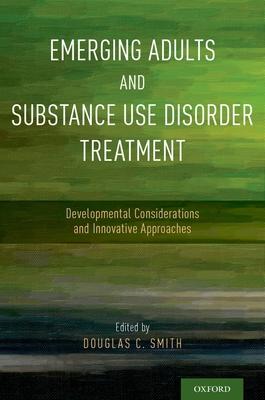Emerging Adults and Substance Use Disorder Treatment addresses how a societal shift in the timing of developmental tasks affects treatment outcomes for substance use disorders, which are among the most highly prevalent and costly mental health problems in the United States. It presents readers with a summary of the developmental period of emerging adulthood as well as a comprehensive review of state-of-the-art substance use disorder treatments for this group.
There are an estimated 30.6 million emerging adults living in the US, and as many as 34.5% of them have serious problems with substances that often require clinical treatments. That equates to 10.5 million emerging adults ages 18-25 in the United States with a substance use disorder. However, research on substance use disorder treatments for emerging adults lags behind that for adolescents and older adults. This book fills a gap for academic audiences on this important and up-and-coming area of research. The first half of this volume address developmental issues associated with emerging adulthood, paying specific attention to how developmental features influence diagnosis and treatment. The second half of the book presents the state-of-the-science on interventions for emerging adults, with each chapter summarizing either a body of work on a particular type of intervention or a special topic affecting intervention delivery to emerging adults.
| FindBook |
有 1 項符合
Emerging Adults and Substance Use Disorder Treatment: Developmental Considerations and Innovative Approaches的圖書 |
 |
Emerging Adults and Substance Use Disorder Treatment: Developmental Considerations and Innovative Approaches 作者:Douglas C.(EDT),Smith 出版社:Oxford Univ Pr 出版日期:2017-11-01 語言:英文 規格:平裝 / 15.9 x 23.5 x 1.9 cm / 普通級 |
| 圖書館借閱 |
| 國家圖書館 | 全國圖書書目資訊網 | 國立公共資訊圖書館 | 電子書服務平台 | MetaCat 跨館整合查詢 |
| 臺北市立圖書館 | 新北市立圖書館 | 基隆市公共圖書館 | 桃園市立圖書館 | 新竹縣公共圖書館 |
| 苗栗縣立圖書館 | 臺中市立圖書館 | 彰化縣公共圖書館 | 南投縣文化局 | 雲林縣公共圖書館 |
| 嘉義縣圖書館 | 臺南市立圖書館 | 高雄市立圖書館 | 屏東縣公共圖書館 | 宜蘭縣公共圖書館 |
| 花蓮縣文化局 | 臺東縣文化處 |
|
|
圖書介紹 - 資料來源:博客來 評分:
圖書名稱:Emerging Adults and Substance Use Disorder Treatment: Developmental Considerations and Innovative Approaches
Play Therapy: Theory, Research, and Practice
Classwide Positive Behavioral Interventions and Supports: A Guide to Proactive Classroom Management
Prolonged Exposure for Ptsd: Innovations to Improve Access, Engagement, and Outcomes
How Words Help Us Think: An Externalist Account of Representational Intentionality
Theories of Borderline Personality Disorder: Concepts and Empirical Base
Mental Health Virtual Reality: The Power of Immersive Worlds
Therapists’ Sexual Feelings and Fantasies: Research, Practice, Ethics, and Forensics
Dreaming Reality: How Neuroscience and Mysticism Can Unlock the Secrets of Consciousness
Consciousness Demystified
Shift: Managing Your Emotions--So They Don’t Manage You
Classwide Positive Behavioral Interventions and Supports: A Guide to Proactive Classroom Management
Prolonged Exposure for Ptsd: Innovations to Improve Access, Engagement, and Outcomes
How Words Help Us Think: An Externalist Account of Representational Intentionality
Theories of Borderline Personality Disorder: Concepts and Empirical Base
Mental Health Virtual Reality: The Power of Immersive Worlds
Therapists’ Sexual Feelings and Fantasies: Research, Practice, Ethics, and Forensics
Dreaming Reality: How Neuroscience and Mysticism Can Unlock the Secrets of Consciousness
Consciousness Demystified
Shift: Managing Your Emotions--So They Don’t Manage You
|










